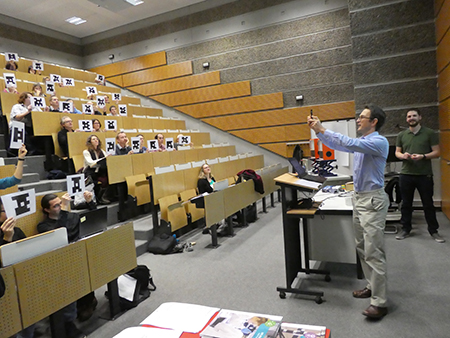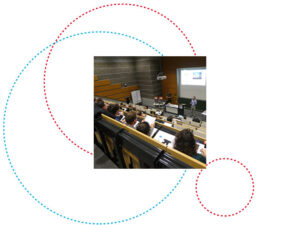In November 2019, members of the Department of Physics and Materials Science, with the support of the Scienteens Lab team, gave a teacher training workshop on renewable energy on Limpertsberg Campus. Altogether 45 teachers from different high schools in Luxembourg attended the event and exchanged on the specific topic: “100% renewable energy in Luxembourg – Is it possible?”
Phillip Dale, Associate professor in the Department of Physics and Materials Science, and organiser of the event, shared his experience with us.
Phillip, could you tell us more about the workshop? What was it about?
Phillip Dale. “The objective of this workshop entitled “100% renewable energy in Luxembourg – Is it possible?” was to inform teachers on the subject of energy, in particular, how to calculate our own daily consumption, and how to calculate how many renewable energy resources we need to support this.
Often our discussions on renewable energy and sustainability are not so well informed, since we miss
quantifiable information. Our discussions are more or less based on a stomach feeling, which may not be so reliable.”
How did you run the workshop?
“The workshop was very interactive. At the beginning of the event, we surveyed the teachers’ expectations to renewable energy, by asking them multiple-choice questions. The audience hold up a card in different orientations depending on their answer (A, B, C, or D). Using a smartphone, the camera reads the orientation, and directly display the results of the survey on screen as a bar chart.
The system we used (Plickers) was a really nice way to interact with the audience, probably even nicer than a web based system.”

Did you get any feedback from the attendees?
“The feedback from the participants was highly positive. Besides, we were invited to the Lycée Michel Lucius in order to give the talk to the students there. Furthermore, another teacher is asking us to develop a full day workshop with his school. Some other participants have requested the slides from the workshop.”
Any last word?
“People are always interested to calculate their own energy consumption, since most of us don’t really know ourselves. When we calculate it, it gives us control, and let us make informed decisions about the activities we carry out in our daily lives. Together with colleagues from the physics and computer science departments, we are developing a web-based app to allow anyone to calculate their daily energy consumption. We hope to release it internally to the university soon.
One interesting outcome is that it is difficult to be a hard travelling successful academic, whilst keeping our energy consumption to acceptable or even average levels. This is certainly something the academic community will have to tackle, although currently we are burying our head in the sand on this issue.”
A new version of this workshop was given on 26 February 2020, as part of the Doctoral School Massena pride. It will take place again on 5 May 2020 in the “Science and Citizens meet Challenges on Sustainability”, which will be an evening course running during the summer semester by Ariane König, Research scientist at the Faculty of Humanities, Education and Social Sciences.
The University has already offered some training workshops in many different subjects in order to get the Scienteens Lab better known with the schoolteachers. Among others, Jan Lagerwall and Anupam Sengupta ran another lookalike workshop last year in the subject of soft and living matter. David Kieffer has done one as well on the use of smart phones as scientific tools.
As many other workshops will follow, further information will be given.
